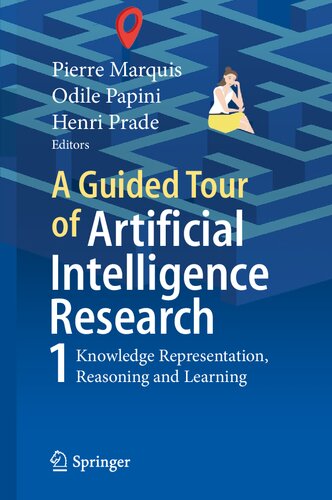

Most ebook files are in PDF format, so you can easily read them using various software such as Foxit Reader or directly on the Google Chrome browser.
Some ebook files are released by publishers in other formats such as .awz, .mobi, .epub, .fb2, etc. You may need to install specific software to read these formats on mobile/PC, such as Calibre.
Please read the tutorial at this link: https://ebookbell.com/faq
We offer FREE conversion to the popular formats you request; however, this may take some time. Therefore, right after payment, please email us, and we will try to provide the service as quickly as possible.
For some exceptional file formats or broken links (if any), please refrain from opening any disputes. Instead, email us first, and we will try to assist within a maximum of 6 hours.
EbookBell Team

0.0
0 reviewsThe purpose of this book is to provide an overview of AI research, ranging from basic work to interfaces and applications, with as much emphasis on results as on current issues. It is aimed at an audience of master students and Ph.D. students, and can be of interest as well for researchers and engineers who want to know more about AI. The book is split into three volumes:
- the first volume brings together twenty-three chapters dealing with the foundations of knowledge representation and the formalization of reasoning and learning (Volume 1. Knowledge representation, reasoning and learning)
- the second volume offers a view of AI, in fourteen chapters, from the side of the algorithms (Volume 2. AI Algorithms)
- the third volume, composed of sixteen chapters, describes the main interfaces and applications of AI (Volume 3. Interfaces and applications of AI).
Implementing reasoning or decision making processes requires an appropriate representation of the pieces of information to be exploited. This first volume starts with a historical chapter sketching the slow emergence of building blocks of AI along centuries. Then the volume provides an organized overview of different logical, numerical, or graphical representation formalisms able to handle incomplete information, rules having exceptions, probabilistic and possibilistic uncertainty (and beyond), as well as taxonomies, time, space, preferences, norms, causality, and even trust and emotions among agents. Different types of reasoning, beyond classical deduction, are surveyed including nonmonotonic reasoning, belief revision, updating, information fusion, reasoning based on similarity (case-based, interpolative, or analogical), as well as reasoning about actions, reasoning about ontologies (description logics), argumentation, and negotiation or persuasion between agents. Three chapters deal with decision making, be it multiple criteria, collective, or under uncertainty. Two chapters cover statistical computational learning and reinforcement learning (other machine learning topics are covered in Volume 2). Chapters on diagnosis and supervision, validation and explanation, and knowledge base acquisition complete the volume.